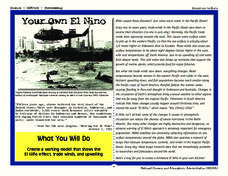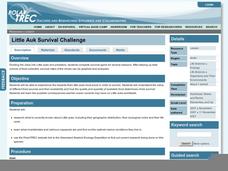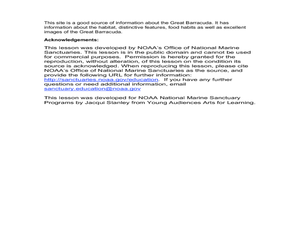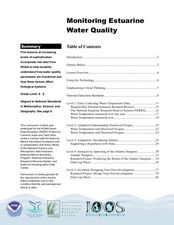Curated OER
Energy Resources: Where Are They and How Do We Get Them?
Future energy engineers visit several stations, each one dedicated to a different alternative source of energy. They describe how solar energy is converted into other forms of energy, the patterns of distribution of energy resources in...
NOAA
Your Own El Nino
Scholars make a model to discover how the force of trade winds over the Pacific Ocean creates an El Niño. Super scientists observe how the severe weather affects life in water and on land.
Curated OER
Little Auk Survival Challenge
A bird's life is one of danger and intrigue as it struggles for survival in sometimes harsh environments. To understand how difficult surviving in the wild can be, children play a simulation game where they act as little auks, birds from...
NOAA
Make an Edible Coral Reef
Coral reefs are full of an abundance of life and color. Why not celebrate it with an edible coral reef? Learners and teachers alike use cake, icing, and candies to create a tasty version of a coral reef that's complete with colors,...
Moorea Coral Reef Long-Term Ecological Research Program
Paper Plate Fishes
Tropical fish make great art projects! Use paper plates to design, color, and assemble round and oval-shaped fish based on photographs of actual fish found along the Moorea Coral Reef. Kids learn about different fins- including the...
Rainforest Alliance
Who Takes Care of the Maya Forest Corridor?
Who keeps animals safe? Who keeps us safe? Discover the helpers that make learning and growing possible through a medley of activities that focus on habitats—ours and those in the rainforest. Scholars are asked to identify one helper who...
Curated OER
Earth Materials Module
This slide show progresses through a comprehensive review of the grounding principles of earth science. Get down and dirty with the details of fossil fuels! Help your geologists to have a rock solid understanding of the rock cycle. The...
Curated OER
El Niño ~ The Return of El Niño
El Niño sure creates a stir when it comes around! Why not stir up your earth science class with this data analysis activity that examines the temperature and precipitation over the 2002-2003 water year. A tracking chart is provided...
Marine Institute
Water Pollution
Sixth graders investigate the various types of pollutants found in water and ways to help prevent water pollution. Through a hands-on experiment, students create samples of polluted water by mixing water with vegetable oil, dirt, and...
NOAA
Endangered Species Origami
Make sea turtle or whale origami in a hands-on activity that provides instructions for folding and facts for learning about each.
Curated OER
environment: Fresh and Saltwater Habitats
Students compare and contrast fresh and salt water coastal environments. After describing how sea animals adapt to their habitats, they design a variety of sea creatures and explain how the adaptations aid in the animals' survival. ...
Curated OER
The Great Barracuda
Students explore oceanography by researching the great barracuda. In this animal life lesson plan, students read several vocabulary terms dealing with ocean life and examine a drawing of a barracuda. Students examine the many...
Curated OER
Schooling Fish
Learners make fish models. In this fish behavior lesson, students create lanternfish fishsticks, learn how a school of fish live, eat and swim together, examine the predator-prey relationship, and read the book Swimmy to facilitate a...
Curated OER
Those Amazing Seaworld Animals
Young scholars research the animals at SeaWorld and then relate the info they have found into various types of graphs; line, circle and bar. This lesson combines math and science nicely. They access a website imbedded in this plan to do...
Curated OER
Sea World Fieldtrip Follow-up
Students create a graphic organizer in preparation for a web page about a specific science-related topic. This lesson is used as a follow-up to a field trip experience and can be adapted for many different subjects.
Curated OER
No Escape
Via four student handouts, marine biology learners examine the topography and circulation cell of the Fieberilng guyot. Then they examine the number of individual hydroids counted at each depth. Pupils use the information to relate water...
Curated OER
Ocean Word and Picture Matching
In this ocean-related vocabulary worksheet, students match the 5 ocean animal names to the 5 appropriate ocean life pictures.
Curated OER
Water Cycle and Ecosystems
Students explore the water cycle. In this investigative lesson, students examine the water cycle process. They will record their observations and discuss marine and freshwater ecosystems.
Curated OER
The Ocean Floor and Shore Zones
Make textbook reading more engaging using this reading activities worksheet, through which scholars review major features found on the ocean floor and the processes that formed these features. They complete 11 terms in a crossword...
Curated OER
Haiku in Translation: Treasure of the Deep
In this online quiz worksheet, students answer a set of multiple choice questions about a Haiku poem based on exotic sea creatures.. Page includes links to answers and resources.
Curated OER
Life in the Ocean
In this ocean life worksheet, students review the animal and plant plankton and photosynthesis in the ocean. Students fill in the blank of 15 statements and then find these terms in a word search.
Curated OER
Monitoring Estuarine Water Quality
Young scholars analyze water quality data from real data. In this environmental science lesson, students examine how salinity and dissolved oxygen affect the living organisms in the estuary. They interpret graphs to support or disprove a...
Curated OER
Monitoring Coral Reefs
Students investigate data on coral reef monitoring in a marine protected area in the Florida keys. In this coral reef lesson plan, students use online data from a marine protected coral reef to complete a worksheet about coral...
Curated OER
Blue Planet: Tidal Seas
Young scholars investigate how tides affect sea life. In this video based lesson plan, students view a video on how tides affect sea life. They do web-based research to find the answers to a series of questions and then play Tidal Trivia...

























